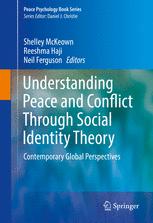

Most ebook files are in PDF format, so you can easily read them using various software such as Foxit Reader or directly on the Google Chrome browser.
Some ebook files are released by publishers in other formats such as .awz, .mobi, .epub, .fb2, etc. You may need to install specific software to read these formats on mobile/PC, such as Calibre.
Please read the tutorial at this link: https://ebookbell.com/faq
We offer FREE conversion to the popular formats you request; however, this may take some time. Therefore, right after payment, please email us, and we will try to provide the service as quickly as possible.
For some exceptional file formats or broken links (if any), please refrain from opening any disputes. Instead, email us first, and we will try to assist within a maximum of 6 hours.
EbookBell Team

4.3
18 reviewsThis volume brings together perspectives on social identity and peace psychology to explore the role that categorization plays in both conflict and peace-building. To do so, it draws leading scholars from across the world in a comprehensive exploration of social identity theory and its application to some of the world’s most pressing problems, such as intrastate conflict, uprising in the middle east, the refugee crisis, global warming, racism and peace building. A crucial theme of the volume is that social identity theory affects all of us, no matter whether we are currently in a state of conflict or one further along in the peace process. The volume is organized into two sections. Section 1 focuses on the development of social identity theory. Grounded in the pioneering work of Dr. Henri Tajfel, section 1 provides the reader with a historical background of the theory, as well as its current developments. Then, section 2 brings together a series of country case studies focusing on issues of identity across five continents. This section enables cross-cultural comparisons in terms of methodology and findings, and encourages the reader to identify general applications of identity to the understanding of peace as well as applications that may be more relevant in specific contexts. Taken together, these two sections provide a contemporary and diverse account of the state of social identity research in conflict situations and peace psychology today.
It is evident that any account of peace requires an intricate understanding of identity both as a cause and consequence of conflict, as well as a potential resource to be harnessed in the promotion and maintenance of peace. Understanding Peace and Conflict Through Social Identity Theory: ContemporaryGlobal Perspectives aims to help achieve such an understanding and as such is a valuable resource to those studying peace and conflict, psychologists, sociologists, anthropologists, public policy makers, and all those interested in the ways in which social identity impacts our world.